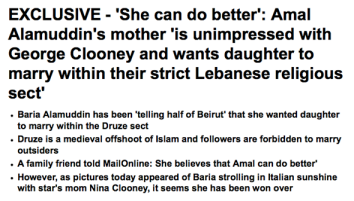The Mail Online is by some measures the world’s most popular online newspaper. It is also shameless—a grotesque compendium of sensational tabloid stories, unverified viral memes, anonymously sourced gossip, thinly veiled sexism, prurient clickbait, and hypocritical moralizing.
Its shenanigans are well-known to Brits, some 4 million of whom regularly read the Mail Online’s print-newspaper progenitor, the Daily Mail. But it took a Hollywood actor to bring the paper’s habitual irresponsibility into the American klieg lights.
Let’s take potent media criticism where we can get it. George Clooney may not be a journalist, but he played one on the big screen. And his diatribe against the Mail, published Wednesday in USA Today, is the sort of righteous broadside that would have made Edward R. Murrow proud.

Screenshot
The actor’s outburst was prompted by a piece (now deleted) that ran in the Mail Online on Monday and the Daily Mail on Tuesday morning. Citing unnamed family members and “Lebanese friends,” the paper reported that Baria Alamuddin, the mother of Clooney’s fiancée, Amal Alamuddin, vehemently opposed the couple’s marriage on religious grounds. Baria Alamuddin had been “telling half of Beirut” that her daughter ought to marry someone from her own Druze faith instead, according to the Mail’s story.
One problem, Clooney said: “Amal’s mother is not Druze.” Another problem: “She has not been to Beirut since Amal and I have been dating, and she is in no way against the marriage.” But that wasn’t the worst of it. As the Washington Post points out, the part of the Mail story that pushed Clooney past the brink was this:
There can be harsh penalties for those Druze who marry outsiders. Several women have been murdered for disobeying the rules. Last year a Sunni Muslim man had his penis severed by the male relatives of a Druze woman who defied her family by marrying him.
The friend added: “There have a been a few jokes in the family about the same thing happening to George!”
The joke, in case it wasn’t clear, is that the Druze sometimes assassinate people like Alamuddin and Clooney. Ha-ha?
In USA Today, Clooney responded with a smackdown so tautly worded and so richly deserved that it has resonated around the Internet. The op-ed is worth reading in full, but here’s an excerpt:
I’m, of course, used to the Daily Mail making up stories—they do it several times a week—and I don’t care. If they fabricate stories of Amal being pregnant, or that the marriage will take place on the set of Downton Abbey, or that I’m running for office, or any number of idiotic stories that they sit at their computers and invent, I don’t care.
But this lie involves larger issues. The irresponsibility, in this day and age, to exploit religious differences where none exist, is at the very least negligent and more appropriately dangerous. We have family members all over the world, and the idea that someone would inflame any part of that world for the sole reason of selling papers should be criminal.
Clooney goes on to point out what I think is really the most insidious thing about the Mail Online: For some reason, other news outlets around the Web (mostly outside of its native U.K.) routinely cite the site’s reporting as though it were a credible news source rather than a shameless, traffic-whoring gossip factory. In this case, Clooney calls out Boston.com, the New York Daily News, Gulf News, and Emirates 24/7 among those that picked up the Mail’s story suggesting that Clooney or his fiancée might be fair game for religious violence. (The New York Daily News, it’s worth noting, has seen its own traffic soar after hiring a former Mail editor to remake its website in the Mail Online’s image.) There were plenty of other accomplices. Together they ensured that the Mail’s story reached far more readers than the Mail alone ever could.
Memo to my fellow reporters: Just because a website has a print newspaper attached to it doesn’t mean it checks its facts—or particularly cares whether or not they’re true.
To be clear, all journalists get things wrong sometimes. I get things wrong sometimes. But that shouldn’t prohibit us from pointing out that the Mail Online in particular is developing quite a pattern of getting things wrong and then failing to transparently correct them.
In one revealing instance, the Mail Online couldn’t even explain how a made-up story—concisely headlined “Dentist pulled out ALL boyfriend’s teeth after he dumped her (and new girlfriend leaves him because of his empty mouth)”—made it onto the site. “I’ve drawn a bit of a blank,” a Mail Online journalist told MSNBC.com when asked where the story came from. That didn’t stop the fake story from spreading to sites ranging from Yahoo News to the Huffington Post to the Los Angeles Times. At least those outlets ran updates admitting their errors and correcting the record. When the Mail Online is publicly confronted with evidence that it botched a story, this is usually all it leaves behind:
The list of ridiculous Mail stories is so long that it has inspired a hit YouTube song and filled listicles on BuzzFeed and the Huffington Post. In 2012 the paper won a prize for “worst science article” for a story headlined “Just ONE cannabis joint ‘can cause psychiatric episodes similar to schizophrenia’ as well as damaging memory.”
The site’s laissez-faire approach to the truth is compounded by its nasty penchant for playing on racial, religious, and sexual stereotypes and phobias—one it appears to have inherited from the print Daily Mail. That paper’s 1993 headline for a story about a controversial study that claimed to identify the genetic roots of homosexuality—“Abortion hope after ‘gay genes’ finding”—is only one of the more infamous examples. In 2009 it used the occasion of a gay pop singer’s death to insinuate that homosexual relationships are unnatural. Last year a transgender schoolteacher committed suicide after being hounded by the press, including a Daily Mail columnist who wrote a column headlined “He’s not only in the wrong body … he’s in the wrong job.”
In an ideal world, the mainstream media and the public would treat Mail exclusives like they treat exclusive reports from TMZ or the National Enquirer. They might well be true, but they’re best viewed as unverified rumors until they can be independently confirmed. But for better and worse, the Web and social media have blurred the lines between reputable news organizations and tabloids, and the Mail has profited handsomely from the confusion.
I have no special insight into the facts behind the Clooney story. But the Mail’s public response to the actor’s op-ed is telling. It swiftly apologized to Clooney on Wednesday and removed the story from its website. In a statement, it added, “We only became aware of Mr. Clooney’s concerns this morning and have launched a full investigation. However, we accept Mr. Clooney’s assurance that the story is inaccurate.”
The show of contrition seems laudable. But more careful news organizations would be shocked by allegations like Clooney’s, and their first priority would be to go to their reporters and editors and find out what happened. The Mail story’s immediate removal—before the paper even begins its promised “full investigation” into the facts—implies that its leaders have no trouble believing that what it printed was essentially a pack of falsehoods.
It isn’t that the Mail sets out to get things wrong. It’s just that, when your mission is to attract page-views at any cost, you do so with the understanding that the truth may be collateral damage. The self-described gossip site Gawker, to its credit, has openly grappled with the consequences of this tradeoff. (Gawker, for the record, is another online-only media outlet that displays far more allegiance to the facts than the Mail.) The Mail has not.
Good for Clooney for calling it out—and for naming some of the sites that picked up the story without checking it out. Publicly shaming bad journalism may not deter an inveterate offender like the Mail, but at least maybe it will make the rest of us think twice before trusting it.
